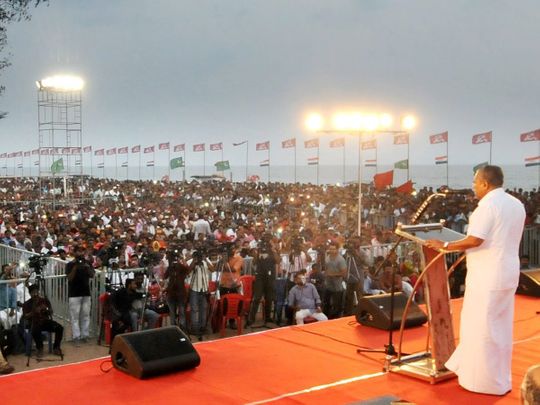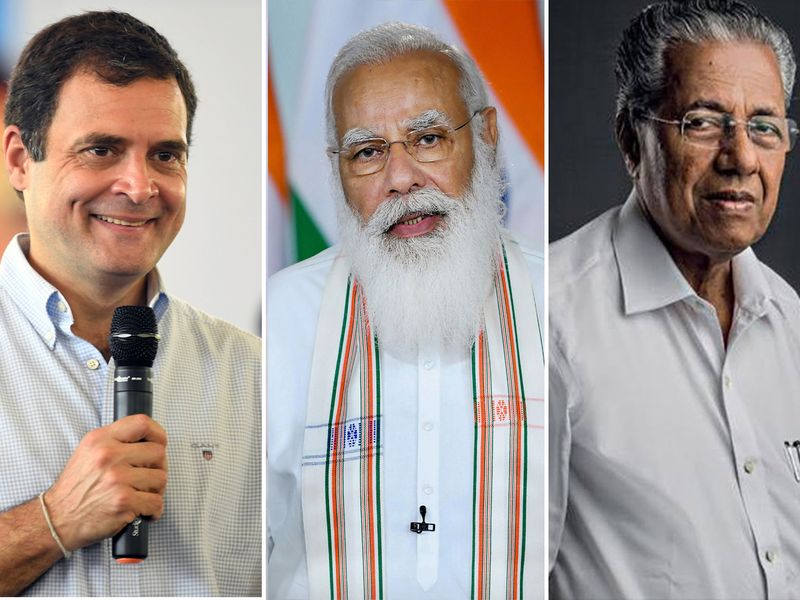
On May 29, 2016 when newly elected Kerala chief minister Pinarayi Vijayan called on Narendra Modi, the prime minister asked him, “Will you do something about the Gas Authority of India Limited (GAIL) pipeline issue?” Vijayan responded positively, “You will see that it will be implemented.”
On January 5, 2021 the prime minister inaugurated the 450-km long natural gas pipeline project connecting Kochi to Mangaluru in a virtual event attended by all the stakeholders including Vijayan.
The multi-million rupees project that didn’t move much between 2014 to 2016 was completed due to Vijayan’s proactive approach. Those who have been involved with the project and another ambitious projects of the National Highway Authority in Kerala swear by Vijayan’s pragmatic attitude for infrastructure development in his state.
In a first of its kind decision, Vijayan agreed to bear around 25% of cost for land acquisition of the National Highway project to speed up the work. Perhaps the best score of Pinarayi Vijayan has been the improvement of government-run schools all over Kerala (a whopping 600,000 students have moved from private schools to the government schools during his tenure).
A unique mix
Kerala assembly elections for 140 seats is due in less than a month — on April 6. If the ongoing West Bengal election campaign is grabbing all the eyeballs, Kerala remains the big fish. The state has 54.7% Hindus, 26.6 % Muslims and 18.4% Christians.
There are a very few places on earth where a Marxist party survives election after election largely on the backing of the prominent religious group. In Kerala CPI-M corners “the Hindu votes” that too without chanting any religious slogans, nor does it vitiate the election campaign to provoke people in name of religion. Still it gets the “Hindu votes”.
In Kerala, identity politics, communal polarisation and public demonstration of religious beliefs are highly subtle, covert and nuanced. The southern state’s politics has been quite comfortable within the framework that allowed two political fronts consisting of more than two dozen parties.
Communist Party of India-Marxist led Left Democratic Front traditionally has the backing of Ezhava/Tiyyar, Other Backward Class community which constitutes 25% of the voters in the state. Also, the large chunk of Dalits, tribal and Vishwakarma votes are in LDF’s kitty.

Traditionally, majority of the Upper caste Hindu votes of the Nair community go to Congress party that leads United Democratic Front. Congress also enjoys support in the fishing community in the coastal areas, the large chunk of the Christians and Muslim votes of Malabar region and elsewhere overwhelmingly back the Congress.
In the assembly election of 2016 CPI-M got 26.7% votes while the Congress received 23.8% votes. The difference between two alliances has been narrow and that’s why these elections are tight. Malayalis are politically-savvy, famously well-informed of political trends and have global consciousness.
In comes the BJP
But, since 2016 the gradual emergence of BJP-led NDA is shaking the traditional and comfortable set up of state politics and also the political culture of Kerala. In 2016 BJP got 10.6% vote but in just 3 years BJP-led NDA in Lok Sabha election increased its vote share to 15.64%.
Most analysts say a section of the Nairs plus Christians who are concerned about retaining control over the Churches and even a small section of elite Muslims who want to be on the right side of power may be looking at the BJP option.
The incumbent LDF and UDF are facing a common concern. If the BJP fares even marginally better, it can cut votes both ways. Will the BJP maintain its 15% vote share, or will it increase? If it grows then it will hit more CPI-M or the Congress?
As the BJP is set to play spoilsport, the importance of Muslim voters’ has increased. The thinking in the CPI-M in this election is that many traditional Muslim voters of Congress would switch over to their side because Pinarayi Vijayan has emerged as a “mini-Modi” — someone who gets work done with firmness — in the state.
Also, the Congress doesn’t have a leader to match stature of Vijayan. With a strong leader like Modi in New Delhi, voters would like a strong leader at home in Kerala.
If the Muslim voters find Vijayan is in a better position to stop the slow but steady growth of BJP in Kerala — compared to the Congress — then LDF’s return to power is given. Recently, Kerala Congress (M) which has base of Christian votes has joined the LDF.
The Vijayan factor
Vijayan keeps a tight control over his party apparatus. In these elections he has come up with the idea that the party ticket would not be given to the leaders who have fought two consecutive election. As a result, highly successful ministers and leaders who were all set to win are forced to pack up. The move has reduced the challenge to him within the party.
While talking about not giving tickets two-term MLAs of CPI-M, Prakash Karat, a powerful leader of CPI-M told Gulf News, “The decision was taken to lay the goal for the future. We want new and fresh faces in the party. We understand the risks, but we have strong organisation on the ground which would help implement the decision.”
There have however been missteps along the way. Vijayan made a political blunder that cost him heavily in Lok Sabha elections. He misread people’s strong reaction against the Supreme Court’s verdict on Sabrimala temple controversy (to allow women devotees in its sanctum sanctorum).
Reading people’s mood quickly, the Congress and the BJP opposed the Court verdict but Vijayan sent policemen along with radical women group to the temple. The voters reacted strongly and the LDF ended up with just 1 seat out of 20 in Lok Sahba polls.
The irony is that the BJP has an intense wish of realising a “Congress-mukt Kerala” that it shares with the CPI-M.
The BJP wants to grow in Kerala but it can grow mainly at cost of CPI-M. It has, already, breached portions of the upper caste Hindu votes of the Congress. The Left block understands this. So, it is taking a strong stand against the BJP and engaging in rhetoric that “BJP-Congress local alliance” is conniving against it.
That may explain the sharp speech by Vijayan against Amit Shah where he dubbed him as an “epitome of communalism.” The more he speaks against the BJP, the more are his chances to dent Congress’s secular votes.
Even the recent controversy of gold smuggling case is harming the state BJP more because many voters are viewing it as politically motivated and a gross misuse of investigating agencies against a popular chief minister.
As the countdown begins, Kerala politics surely appears on the cusp of change.









